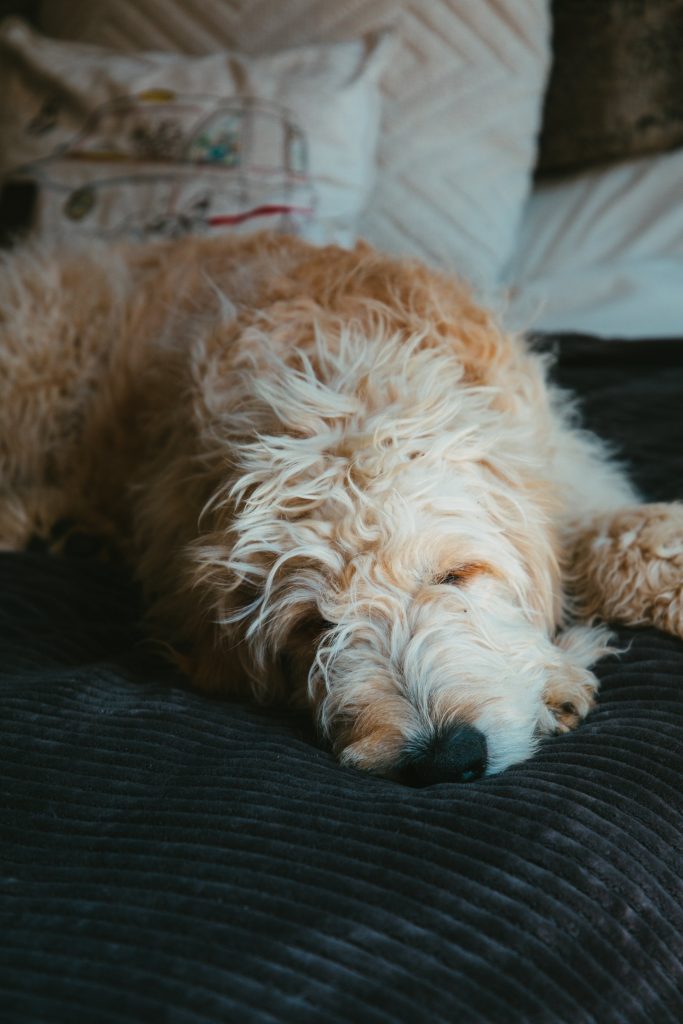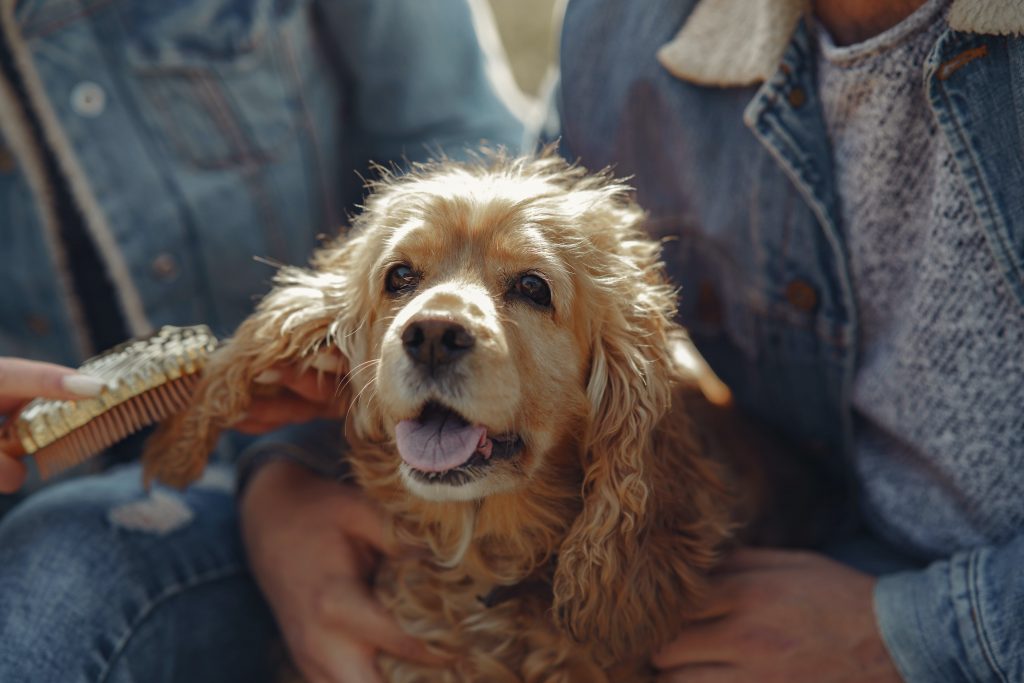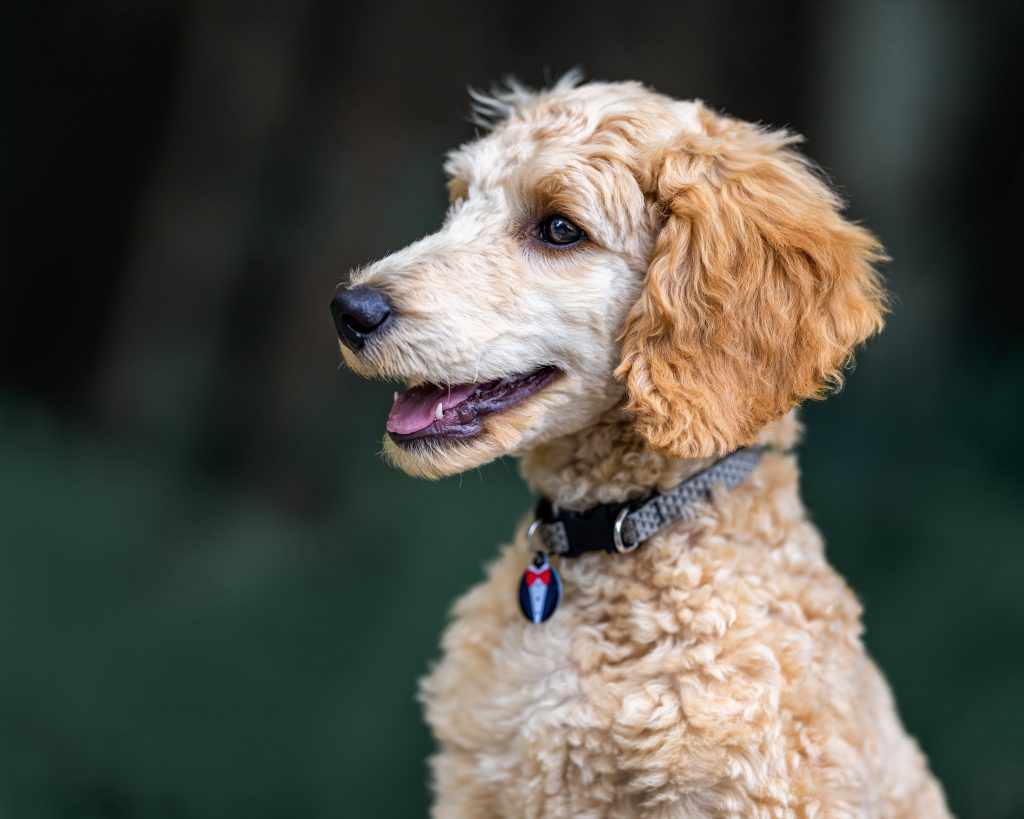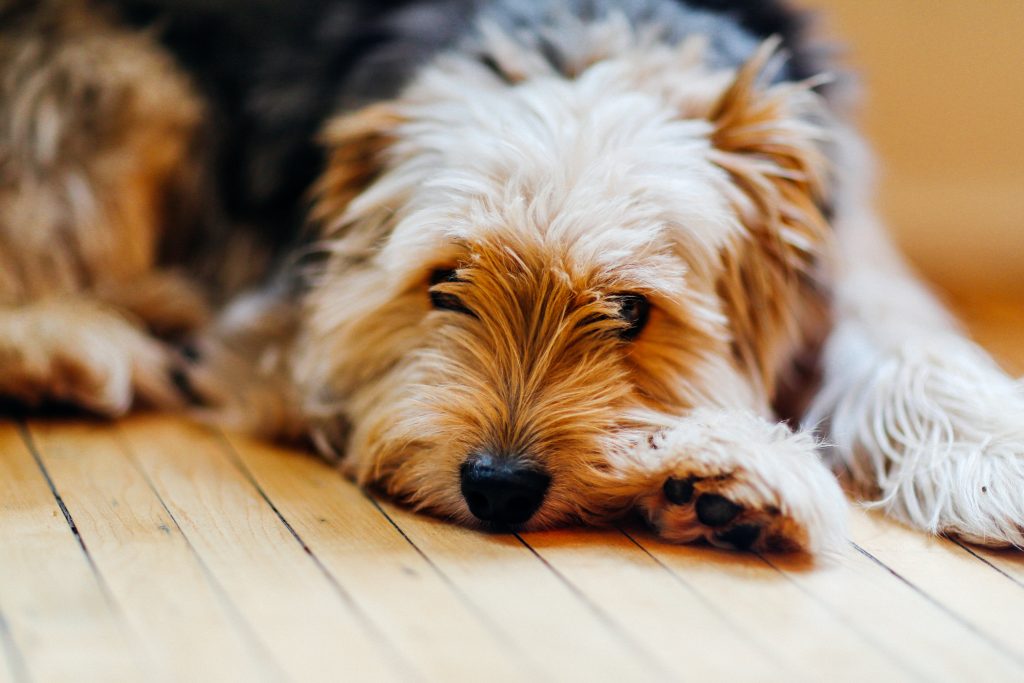Has your beloved Doodle suddenly started losing fur, leaving you puzzled and concerned? Hair loss in Goldendoodles can be triggered by a variety of reasons, such as dry skin due to weather changes. Why is my doodle shedding all of a sudden?
This article will delve into the various causes for sudden shedding in doodles and provide practical solutions to manage it. Keep reading to uncover potentially life-saving insights about your furry friend’s well-being!

Key Takeaways
- Hair loss in dogs, also known as alopecia, can be caused by allergies, parasites, skin conditions or infections, post-grooming alopecia, or hypothyroidism.
- Common symptoms of hair loss in dogs include bald spots, thinning hair, dry and flaky skin, excessive shedding, redness and itching.
- Proper grooming techniques and a balanced diet can help prevent sudden hair loss in doodles. Medications may be necessary to treat underlying health issues causing the hair loss.
- If your doodle is experiencing persistent or severe hair loss along with other concerning symptoms, it’s important to consult a veterinarian for proper diagnosis and treatment options.
Understanding Hair Loss in Dogs
Hair loss in dogs refers to the excessive shedding or thinning of fur, and it can be a sign of an underlying health issue.
What is hair loss in dogs?
Hair loss in dogs, also called alopecia, is when fur falls out more than usual. Dogs might have bald spots or lose hair all over their body. The skin can look normal or it could be red and bumpy.
Alopecia means the hair does not grow back right. Sometimes, lost hair will come back when the weather changes. But if your dog is losing a lot of hair for no clear reason, they may have health issues like an infection or disease.
Symptoms of hair loss in dogs
Hair loss in dogs can be identified through various symptoms. These include bald spots on the dog’s coat, thinning hair, and dry and flaky skin. You may also notice excessive shedding or clumps of hair coming out when you brush your dog.
In some cases, the hair loss may be accompanied by redness, itching, or inflammation in the affected areas. It is important to pay attention to these symptoms as they could indicate underlying health issues that need to be addressed promptly.

Common Causes of Sudden Hair Loss in Doodles
Sudden hair loss in Doodles can be caused by allergies, parasites, skin conditions or infections, post-grooming alopecia, or hypothyroidism.
Allergies
Allergies can cause sudden hair loss in doodles. When a dog is allergic to something, their immune system overreacts and causes skin irritation and itching. This leads to excessive scratching, which can result in bald spots or patches of missing fur.
Common allergens for dogs include pollen, dust mites, certain foods, and flea bites. If you notice your doodle scratching excessively or developing bald spots, it’s important to identify and address the underlying allergies with the help of a veterinarian.
Parasites
Parasites can also cause hair loss in dogs, so it’s important to check for any signs of infestation. Fleas, ticks, and mites are common parasites that can irritate your dog’s skin and lead to excessive scratching and biting.
This constant scratching can result in bald spots or patches of thinning fur. Regularly checking your dog for these pests and promptly treating any infestations is crucial in preventing further hair loss.
Additionally, some parasites like mange mites can cause severe hair loss all over the body if left untreated. So make sure to consult with your veterinarian if you suspect a parasite may be causing your doodle’s sudden shedding.
Skin conditions or infections
Skin conditions or infections can also cause sudden hair loss in doodles. Conditions such as mange, which is caused by parasitic mites, can lead to bald spots and itching. Bacterial infections on the skin can also result in hair loss.
It’s important to address these conditions promptly to prevent further discomfort for your dog. If you notice any redness, sores, or excessive scratching along with the hair loss, it’s a good idea to consult a veterinarian for proper diagnosis and treatment.
Regular grooming and maintaining a clean environment can help prevent these skin conditions from occurring in the first place.
Post-grooming alopecia
Post-grooming alopecia is a condition where dogs experience hair loss after being groomed. This can happen if the grooming process damages the hair follicles, causing them to stop producing new hair.
It’s important to be gentle when grooming your doodle and avoid excessive brushing or using harsh products that can irritate their skin. If you notice bald spots or excessive hair loss after grooming, it’s best to consult your veterinarian for proper diagnosis and treatment options.
Hypothyroidism
Hypothyroidism is a condition where the thyroid gland doesn’t produce enough hormones. It can cause hair loss in dogs, along with other symptoms like weight gain and tiredness. If your doodle is losing fur and showing signs of hypothyroidism, it’s important to consult a veterinarian for diagnosis and treatment.
Medication may be prescribed to help regulate hormone levels and manage the hair loss. Regular check-ups will also be needed to monitor your dog’s progress and adjust the treatment if necessary.

Treatment and Prevention
To treat and prevent sudden hair loss in doodles, it is important to focus on proper grooming techniques, ensure a balanced diet with the right nutrition, consider medications if necessary, and address any underlying health concerns.
Proper grooming
Proper grooming is essential for preventing hair loss in your Goldendoodle. Regular brushing helps to remove loose hairs and prevent matting, which can lead to excessive shedding. Use a brush that is suitable for your dog’s coat type, such as a slicker brush or a comb with wide teeth.
Be gentle when brushing so you don’t cause any discomfort or irritation to your dog’s skin.
Bathing should be done regularly but not too frequently, as excessive bathing can strip the natural oils from your dog’s skin and coat, causing dryness and hair loss. Use a mild shampoo specifically formulated for dogs and rinse thoroughly to remove all soap residue.
After bathing, make sure to dry your dog completely using a towel or blow dryer on low heat.
In addition to regular brushing and bathing, it’s important to check your Goldendoodle’s ears regularly for signs of infection or mites. Clean their ears gently with an ear cleaning solution recommended by your veterinarian.
Diet and nutrition
Proper diet and nutrition play a crucial role in maintaining your Doodle’s overall health and preventing hair loss. Providing a balanced and nutritious diet can help strengthen their immune system, promote healthy skin, and reduce the risk of allergies or other underlying conditions that may cause hair loss.
Make sure to feed them high-quality dog food that contains essential nutrients like protein, omega-3 fatty acids, vitamins, and minerals. If you suspect any deficiencies or have concerns about your Doodle’s diet, consult with your veterinarian for professional advice on the best dietary plan for your furry friend.
Medications
If your Doodle is experiencing sudden hair loss, medications may be part of the treatment plan. Depending on the cause of the hair loss, your veterinarian may prescribe certain medications to help address the underlying issue.
For example, if allergies are causing the hair loss, antihistamines or steroids might be prescribed to help reduce itching and inflammation. In cases where bacterial infections are present, antibiotics may be necessary to clear up the infection and promote hair regrowth.
It’s important to follow your veterinarian’s instructions when giving medications to ensure they are effective in treating your dog’s hair loss.
Addressing underlying health concerns
If your doodle is experiencing sudden hair loss, it’s important to address any underlying health concerns. Hair loss in dogs can sometimes be a symptom of an underlying medical issue.
For example, hypothyroidism, a condition where the thyroid gland doesn’t produce enough hormones, can cause hair loss in dogs. Other health conditions such as allergies or hormonal imbalances may also contribute to hair loss.
It’s essential to consult with your veterinarian to determine the root cause of the hair loss and develop a treatment plan tailored to your dog’s specific needs.
When to Consult a Veterinarian
If your doodle is experiencing persistent or severe hair loss, along with other concerning symptoms, it’s time to consult a veterinarian for proper diagnosis and treatment options.
Keep reading to learn more about when to seek professional help for your furry friend’s sudden shedding.
Persistent or severe hair loss
If your doodle is experiencing persistent or severe hair loss, it’s important to consult a veterinarian. This could be a sign of an underlying health condition or infection that needs medical attention.
Along with hair loss, other concerning symptoms like redness, swelling, or itching should also be discussed with the vet. When talking to your veterinarian, be sure to provide them with all the necessary information about your dog’s symptoms and any changes in their behavior or environment.
Remember that early detection and proper treatment are key in addressing hair loss issues in dogs.
Other concerning symptoms
If your Goldendoodle is experiencing sudden hair loss, there may be other symptoms to look out for. These could include redness or inflammation on the skin, persistent itching or scratching, sores or scabs on the skin, and changes in behavior such as increased irritability or lethargy.
It’s important to pay attention to these signs and consult a veterinarian if you notice any of them in addition to the hair loss. They can help determine the underlying cause and provide appropriate treatment or solutions for your dog’s condition.
Tips for talking to your veterinarian
When discussing your dog’s hair loss with your veterinarian, it’s important to be clear and provide as much information as possible. Describe the symptoms you’ve noticed, such as bald spots or dry skin.
Mention any potential triggers like changes in weather or grooming habits. Be prepared to answer questions about your dog’s diet, lifestyle, and any recent changes. Remember to ask about possible treatment options and how to prevent further hair loss.
Open communication will help your vet make an accurate diagnosis and develop a suitable treatment plan for your furry friend.

Conclusion
If your Goldendoodle is experiencing sudden hair loss, it could be due to various factors such as dry skin, allergies, or underlying health conditions. It’s important to address these issues through proper grooming, a balanced diet, and veterinary consultation when needed.
Remember that seasonal shedding is normal for dogs, but if you notice persistent or severe hair loss, it’s best to seek professional advice. Taking care of your Doodle’s coat will help them stay healthy and happy!
FAQs
1. Why is my Doodle suddenly losing fur?
Your Doodle could be shedding due to a range of causes like hormonal hair loss, allergic reactions, hypothyroidism or even stress factors like abrupt changes in their environment.
2. What can cause bald spots in dogs?
Some common causes of bald spots in dogs include canine hair loss diseases, excessive dog hair loss from poor diet or underlying health conditions.
3. Can I do anything if my dog has dry skin and hair loss?
Yes! For issues with dog dry skin and hair loss, coat maintenance routines can help along with special dog hair loss remedies suggested by your vet.
4. Are there any treatments for dog shedding and sudden hair loss?
There are many kinds of treatment available for this problem such as dietary adjustments to fix nutritional deficiencies or medical treatments based on veterinary consultation.
5. Is there a specific time when dogs shed more than usual?
Yes – during the “shedding season,” most pets lose more fur than usual to adapt to weather changes.


